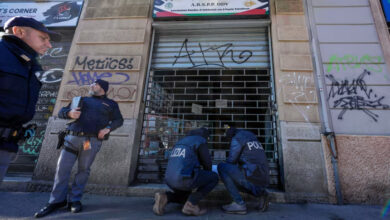ROME — Italy's Senate prepared Friday to vote on economic reform measures demanded by the European Union that should pave the way for Premier Silvio Berlusconi to leave office in a matter of days.
The prospect of a transitional government headed by respected non-partisan economist Mario Monti calmed markets for a second day, with Italy's 10-year borrowing rate down a further 0.21 percentage point to 6.59 percent. Shares were buoyant too, with the Milan stock index was up 1.7 percent in early trading at 15,477.
Markets have been roiled all week over Italy's political uncertainty and fears that the country was heading for a Greek-style economic crisis that would threaten the existence of the entire eurozone.
They calmed Thursday after a groundswell of politicians rallied around Monti to lead a post-Berlusconi government, though there were still holdouts and divisions within the Berlusconi government over whether to support him.
Italy is under intense pressure to prove it has a strategy to deal with its debts, which stand at 1.9 trillion euros (US$2.6 trillion), or a huge 120 percent of economic output — it has to rollover a little more than 300 billion euros of its debts next year alone. But economic growth is weak and the government failed to enact reforms to revive it over the past decade.
With the eurozone and global economies at risk in the event of an Italian default, European governments are pushing Italy to clear up questions over its political leadership quickly.
The Senate is expected to vote later Friday on the budget bill following its passage in the Senate budget committee Thursday evening. The lower Chamber of Deputies could take up the legislation as early as Saturday.
Berlusconi has promised he would resign thereafter, and Italy's president held two hours of talks Thursday night with Monti — a strong indication he intends to ask him to try to form a government once Berlusconi steps down. Monti is currently meeting with the Senate president, another sign that the transition process is being ironed out.
While passage of the reform legislation is critical for Italy's political transition, the measures themselves don't do all that's necessary to rein in debt or spur growth, which the International Monetary Fund projects at 0.6 percent this year and 0.3 percent next year.
The EU has already said Italy will need to take additional measures to balance the budget as promised by 2013.
European Council President Herman Von Rompuy will hold talks with Berlusconi on Friday night — a visit that was scheduled before the premier's pledge to resign.




